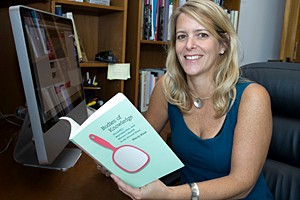
New Book Examines How Ordinary Women Revolutionized Healthcare in America
As 40th anniversary celebrations get underway surrounding the book, Our Bodies Ourselves, a new history examines the battles of ordinary women in demanding equality, choice and respect in medical treatment and education about their own bodies. University of Cincinnati researcher Wendy Kline, an associate professor of history, uncovers their struggles and their empowerment in her new book, Bodies of Knowledge Sexuality, Reproduction, and Womens Health in the Second Wave, published by The University of Chicago Press.
Described as one of the most compelling accounts of the history of womens health and feminist activism, Klines book begins by tracing the impact of the Boston Womens Health Book Collective that organized in 1970, leading to the publishing of Our Bodies Ourselves in 1973 a book that has never gone out of print and is now translated into numerous languages. It was a movement that was credited with driving social change around the world, as it generated the first open conversations about womens health and sexuality.

Book
Kline was one of the first researchers to gain access to the archives of the Boston Womens Health Book Collective, which is housed at the Schlesinger Library at Harvard University. Kline says the papers include thousands of letters from ordinary women perhaps the only accounts they had ever written or spoken of regarding the hurdles they encountered in gaining access to knowledge about their own reproductive systems a taboo topic in a more conservative era dominated by male doctors.
These were women writing from their kitchen tables, who left no other written record but these pages of how the treatment they endured had left them so angry and in some cases, this anguish led to the end of their marriages, Kline says. Some of the most revolutionary events were not related to the abortion debate, but instead surrounded general health issues and how poorly these women felt they were treated by their doctors.
It wasnt just a feminist issue, but it was the idea that your own knowledge about your own body was legitimate. It wasnt privileged doctor knowledge but rather the argument that everyone has the right to information about their body, and I argue that this really came out of the womens health movement, says Kline.
The book explores four themes regarding treatment and education that emerged from the movement
- The controversy surrounding medical school instruction of pelvic exams in the 1970s
- The abortion debate and womens health
- The racial controversy surrounding the promotions of Depo-Provera as a contraceptive and the impact of the Public Board of Inquiry investigation into its safety
- Midwifery, Lamaze and choices in childbirth
Kline says the book not only examines the progress that was made as a result of the womens health movement, but also touches on the following generations of women that emerged as the daughters of feminism, and the issues they face today.

Kline
The book is available in hardcover and paperback and can be ordered online.
It is also available at a discount on Amazon.com.
Klines book will be featured in a book-signing and discussion at 5:30 p.m., Thursday, Oct. 7, in the Taft House Lecture Room, located in UCs Charles Phelps Taft Research Center at 2625 Clifton Ave. in Stratford Heights. The book-signing part is hosted by the Taft Research Center and the Medical Humanities Research Group.
Related Stories
How to keep birds from flying into your windows
July 3, 2024
UC College of Arts and Sciences professor Ron Canterbury tells the Indianapolis Star that simple steps can prevent birds from strike windows around your home or business. Yahoo! News shares the story.
Meet UC’s Miss Ohio
July 1, 2024
UC biomedical science student Stephanie Finoti credits UC for helping to prepare her for the Miss Ohio Scholarship Pageant. She will represent Ohio in the national competition in January.
UC alum credits journalism program with early success
June 26, 2024
Zachary Jarrell came to the University of Cincinnati in 2019 to pursue a degree in statistics. In 2023, he graduated with a Bachelor’s in Journalism. For many undergraduates, the journey through college rarely takes the expected track. Detours happen, and majors change. When plans switch up, it can be helpful to a student’s success to find support. For Jarrell, it was the people he worked alongside in the journalism department who helped him on his journey. It has left a lasting impression on his life so far, guiding him to multiple internships as an undergraduate, real-world experience in prominent news outlets, and eventually a successful career in the highly competitive field of journalism.
